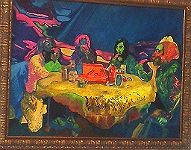I have written with interest, here and here, Lawrence Auster's latest presentation on Islam, this time his debate with moderate Muslim Supna Zaidi. I mentioned in my comments that this was probably the first time a moderate Muslim has debated someone who doesn't accept that terminology of Muslims, or if they do exist, their importance as a group.
And it was worthwhile following that event, illuminating for me something of this "moderate" Muslim who has been the subject of so many Islamic experts and scholars, and a qualifier that many Muslims have taken on.
Despite a full afternoon of presentations, debates, questions and even audience participation that tried to convince Miss Zaidi to the contrary, she still left with the idea that moderate Muslims are an authoritative group, and an antidote to the "radicals" and "Islamists" out there, and that they are allies of Western societies in combating the harm that (radical) Islam is causing.
Ultimately, nominal Muslims (perhaps that is a better term than moderate) are dangerous. They appear to be like the nominal Christians (and reform/nominal Jews), who tend to quote parts of their holy books to make their points, but who invariably lead societies down dangerous paths. For example, it is nominal Christians and Jews who use the biblical verses about helping strangers to validate illegal immigrants’ presence, thereby putting society in all kinds of dangers, both life threatening and other slowly encroaching problems such as affecting the economy.
There is also something of an elitism amongst nominal Christians and Jews, who find that their "fundamental" counterparts are callous and unduly harsh and unrefined in their approach to their religion and lives, making these kinder, gentler nominal Christians and Jews superior.
Miss Zaidi, and I assume her association (still to be formed) of moderate Muslims, seems to just want to live an unencumbered life maintaining her culture and what she perceives to be her religion. She even talks several times that religion (Islam, in her case) should be practiced privately. This is a glaring contradiction in the face of the very public and aggressive religion that Islam is. She keeps contrasting the aggressive Arab Muslims with the quieter (more moderate?) South Asian Muslims, despite her inability to put Pakistan in that category. Her point being that her brand of Islam – moderate and South Asian - is superior and less aggressive, and hence more in-line with Western societies, than the more primitive "radical" Islam.
I think ultimately, these nominal religious groups, elitist and pushing liberal agendas, are a danger to society. They use wishful thinking – as Mr. Auster aptly put it – to promote their version of the world, ignoring the realities and dangers which, in Islam’s case, is out to destroy all non-Muslim societies.
I think that we have given moderate Muslims, and their notion of moderate Islam, enough time to prove their points. As this interesting debate has demonstrated, they have nothing to show for themselves. There are no moderate Muslim groups and whatever splinters there are, they have proven themselves incapable of fighting off aggressive "radical" Muslims. Ironically, they may even be as dangerous to us as the "radical" Muslims they speak against.
It is time to forget about moderate Muslims and moderate Islam, and to get to the business of defending our societies from Islam, pure and simple.
skip to main |
skip to sidebar


NEW OUTLOOK,






.

.
NEW OUTLOOK,
SAME ISSUES
.
.

.

.
BLOG ARCHIVE
-
►
2010
(63)
- ► April 2010 (12)
- ► March 2010 (15)
- ► February 2010 (9)
- ► January 2010 (10)
-
▼
2009
(125)
- ► December 2009 (17)
- ► November 2009 (23)
- ► October 2009 (23)
- ► September 2009 (2)
-
▼
May 2009
(15)
- Visible Minorities in the Greater Toronto Area
- What's the Difference Between Levant and the HRCs?
- Update on Immigration and Visible Minorities
- My Question to Ezra Levant
- Immigration and Visible Minorities
- Now For a Bit of Humor
- The Human Rights Commissions Are Here To Stay
- Duplicity Through Design
- Al Jazeera (English) Coming to a Station Near You!
- Muslims and Typhoid Mary
- Now Magazine's Unreliable Allies
- The Significance of the Cross
- Muslim Immigrants (Again)
- Responding to a Moderate Muslim's Arguments
- Let's Get On With The Business Of Defending Oursel...
- ► April 2009 (9)
- ► March 2009 (6)
- ► February 2009 (5)
- ► January 2009 (5)
-
►
2008
(29)
- ► December 2008 (4)
- ► November 2008 (3)
- ► October 2008 (2)
- ► September 2008 (20)
-
►
2007
(2)
- ► November 2007 (1)
- ► January 2007 (1)
.


.
.
TOPICS
.
- About
- Action
- Ads
- Art
- Articles
- Books
- Buildings
- Christianity
- Comedy
- Converts
- Counter-Jihad Movement
- Culture
- Design
- Dress
- Emails and Letters
- Europe
- Events
- Exhibitions
- Fatwa
- Film
- Food
- Freedoms
- General
- Government
- Halal
- Holidays
- Human Rights Commissions
- Immigration
- Interviews
- Islam
- Islamization
- Jihad
- Koran
- Language
- Laws
- Lawsuits
- Mosques
- Multiculturalism
- Music
- Muslims
- Other
- Personalities
- Politics
- Racism
- Religion
- Schools
- Sharia
- TV
- women
.
.

.




